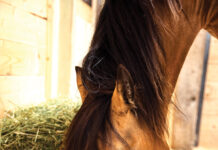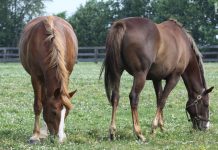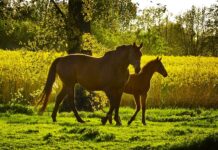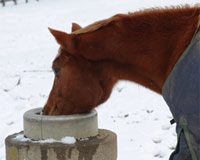Which should be fed first – hay or grain? If you’re feeding correctly, this issue is truly a moot point because the horse should have access to forage (hay and/or pasture) 24/7 with no gaps. Therefore, when fed concentrates, the horse’s digestive tract should already have hay flowing through it.

If hay is present in the stomach first, it creates a physical barrier for the grain to move out of the stomach as quickly. Since starch does not get digested in the stomach, the grain is simply mixed and churned into a semi-liquid mass, which enters the small intestine where it can be digested down to glucose.
If there is hay present, fiber mixes with the starch and the whole mass enters the small intestine. Fiber is not digested until it reaches the hind gut, but its presence slows down the digestion of starch, and obstructs the absorption of glucose into the bloodstream, leading to a less dramatic rise in insulin.
One thing to note – there is more water involved when hay is present (from increased drinking and saliva production). This is a good thing since digestion within the small intestine cannot take place without water.
Juliet M. Getty, Ph.D. is an independent equine nutritionist with a wide U.S. and international following. Her research-based approach optimizes equine health by aligning physiology and instincts with correct feeding and nutrition practices. Dr. Getty’s goal is to empower the horseperson with the confidence and knowledge to provide the best nutrition for his or her horse’s needs. www.GettyEquineNutrition.com





